"Whether you are fascinated by History, Biology, Psychology or anything else, there will be a paper for you."
Arthur did his A-levels in Bury, Greater Manchester (North West England), and wrote this at the end of his first year studying Linguistics here at Christ’s College, Cambridge.
Why did you choose Linguistics?
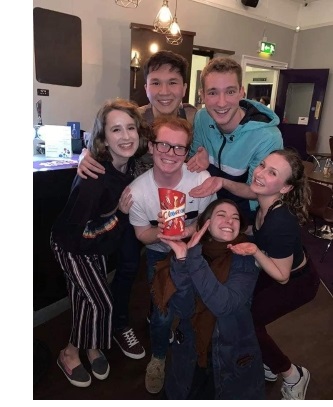
At school, I always felt like the subjects I was doing had absolutely no application in the real world, and Linguistics is the exact opposite. In Linguistics, you study a part of life that never fails to be essential: communication. This not only means that you can really engage with the content (because you experience it in your everyday life), but also means that you can spark interesting discussion and debate with absolutely anyone. Everyone has their own opinions on language, and most of them can be considered relevant even if the person you are speaking to has no actual expertise to reinforce what they are saying. This is because Linguistics is a relatively young subject, without many universally accepted schools of thought.
Admittedly, this does vary between areas of Linguistics. Phonetics, for instance, is a much more scientific area of study with less room for debate or hypothesising. However, this actually highlights another aspect of Linguistics that appealed to me when I was applying – how broad the subject is in its areas of study. On the Cambridge course in particular, there are a huge number of papers to choose from in the second and third year. Structuring the course this way means that you can specialise and really elevate your knowledge in the areas that you are most interested in and passionate about. Whether you are fascinated by History, Biology, Psychology or anything else, there will be a paper for you.
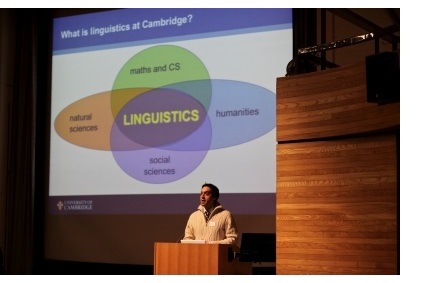
Unfortunately, that also means that some areas of Linguistics will inevitably interest you less. This can be hard because you are required to study four general papers in first year, and so you will quickly discover which aspects of Linguistics you do not like. However, I've found that this isn’t actually that bad. Firstly, you need to study these papers because without trying everything out, you will never know what there is to avoid. For instance, I thought I was going to be fascinated by the history of language, but it turns out that it wasn’t for me and actually I find studies on sentence structure much more interesting. Secondly, there is a lot of crossover in these areas of Linguistics, and any knowledge from these first year lectures – even the ones you don’t like – may go on to inspire you in your second and third year papers.
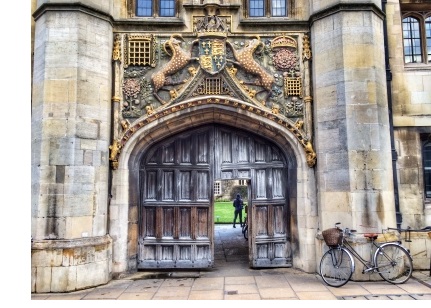
repainted
Why Christ’s?
I chose to apply to Christ’s for a few reasons, many of which are the reasons they tell you to avoid considering when you apply:
- Christ’s is the first alphabetically.
- For my subject, it was one of 10 Colleges that didn’t require that you hand in two prewritten essays when you apply.
- It’s close to the ADC Theatre.
However, once I arrived, I quickly realised that there were so many more legitimate reasons for applying to Christ’s:
- There is huge opportunity to receive grants and funding from the College I have received a book grant and a travel grant in my first year alone.
- Christ’s has amazing facilities – there’s a pool, a gym and even its own theatre!
Most importantly, Christ’s is one of the most central Colleges there is. This means that everything in the city is available to you via a fifteen-minute walk at most, and you have plenty of chances to visit all the other Colleges in the city centre. In fact, half of my friends at Cambridge are from separate Colleges, who I have met through College-organised socials, theatre and my course.
"Christ’s has amazing facilities – there’s a pool, a gym and even its own theatre!"
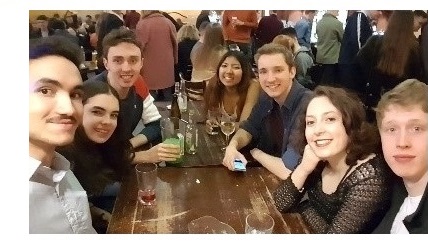 How did you find the application process?
How did you find the application process?
In short, the application process was daunting, but it didn’t need to be. Getting into Cambridge is obviously hard and requires a lot of work, but at the end of the day the application process is also very rewarding, whether you succeed or not. The interviews are good practice for your later career, and applying to Cambridge can seriously expand your experience and knowledge of what this might be like. It is also worth noting that if you fail to get into Cambridge, then it is not necessarily because you aren’t clever enough.
Interviewers are looking for a multitude of things, but there are two that I think are vital:
- Firstly, they’re looking to check that you have a genuine interest in the subject you are applying for. This doesn’t necessarily mean that they’re expecting you to know everything about the subject, especially since Linguistics is a subject that you don't normally study at school. However they will want you to have thought about what the subject involves, read some introductory material and found some areas of study that interest you.
- Interviewers also look at how well you will thrive in the Cambridge academic environment. Cambridge and Oxford are unique in the way they teach because they provide small group supervisions that require in-depth discussion. Interviews are like shorter versions of supervisions, and they help the interviewer to see how this method of teaching may suit you. Therefore, discussion and learning in your interview is a great thing! You should be willing to ask questions and listen when you come across something that you don’t understand. They want to see you thinking and working, and so even if the discussion is on something you don't know much about yet, as long as you’re engaging and making some educated guesses here and there, the interviewers will see that you are interacting well with the subject matter. Of course, you may also find out from your interview that the supervision style of teaching is not for you, and that can be just as positive to find out too.
This is information I only found out after arriving at Cambridge, but I wish I had known earlier. Knowing this not only lessens the blow in confidence if you are rejected (hopefully this won’t happen, but you should always be prepared for it upon applying) but it also makes the whole process feel a lot less pressurised and more transparent.
"Getting into Cambridge is obviously hard and requires a lot of work, but at the end of the day the application process is also very rewarding, whether you succeed or not."
How did Cambridge compare to your expectations?
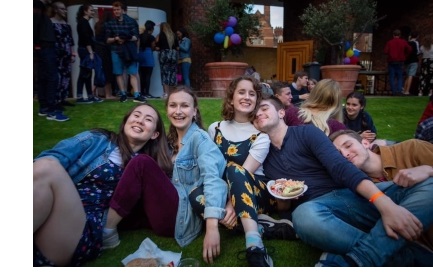
grass can be walked (and sat) on
There are so many myths surrounding Cambridge and the Cambridge lifestyle! I’d heard them all before I applied – everyone is rich; there is no time to do anything except work; no student is allowed to walk on grass – but luckily I had a friend who had recently graduated from Cambridge, to tell me the reality behind these myths: it can be true sometimes, but mostly it’s all lies. Some people are rich here, some people work constantly and some patches of grass can only be used by Fellows, but most people will be just like you! At any university, there will be rich people or people who constantly go out or people who are always dressed in suits etc. Cambridge is no different and no one can deny that. Consequently, like at any other university, you have to look out for the people that you think you have most in common with. This could be the people who go to formal dinners (which are really just meals you dress up for) every night, or it could be the people that never go at all. It’s all up to you.
What do you do when you’re not working?

The ‘What else?’ part of Cambridge is a very important thing to me - one of the best bits about Cambridge. There are so many things outside of academics, formal dinners and punting that make up what Cambridge truly is. All you have to do is go to the Freshers' Fair in the first week of term to see the hundreds of societies there are on offer, and those don’t even include the College-specific ones!
Take me as an example: I spend my days working, and my evenings rehearsing for shows. I love theatre, and when I arrived I very quickly realised that there were four university-wide shows put on every week and another bunch produced by College drama societies. I had an unbelievable amount of opportunity to get involved, and meet people with similar interests. This is a social community that I really feel a part of now and that I am extremely invested in, and I think this is true of all societies. Whether it’s Dungeons and Dragons, darts or just drinking that you like to do for fun, there’s a place for you full of people with the same passion.
"There are so many things outside of academics, formal dinners and punting that make up what Cambridge truly is."
What are you looking forward to next year?
 There’s a lot more that I’m looking forward to in second year than there was before I arrived for Freshers’. I have chosen four courses next year that I am genuinely interested in and passionate about (‘Phonetics’, ‘Psychology of Language Processing and Learning’, ‘Language Acquisition’ and ‘Semantics and Pragmatics’) and I can’t wait to get stuck into them. I think my grades next year will be higher for this reason. I also think that organising my time – particularly, separating my working time from my social time – will be a lot easier because of this.
There’s a lot more that I’m looking forward to in second year than there was before I arrived for Freshers’. I have chosen four courses next year that I am genuinely interested in and passionate about (‘Phonetics’, ‘Psychology of Language Processing and Learning’, ‘Language Acquisition’ and ‘Semantics and Pragmatics’) and I can’t wait to get stuck into them. I think my grades next year will be higher for this reason. I also think that organising my time – particularly, separating my working time from my social time – will be a lot easier because of this.
This brings me onto the second exciting thing about next year: after three terms of experimenting, I have worked out how to balance my College life, theatre life and work life. This is something that caused me some stress in first year. I often found myself worrying that I was neglecting certain friends or that I was neglecting my degree because of one aspect of my life being more prominent than the others. This year, that isn’t an issue. I can confidently say that I have scheduled what theatre I’m getting involved with for the term. I’m going to be involved in a production of Chicago, singing in the termly ADC Bar Nights, writing a musical and possibly appearing in the Footlights’ Panto again. Working out what you are doing prior to term starting is something I would highly suggest if you want to get involved in theatre, and I have established a solid working week plan that is
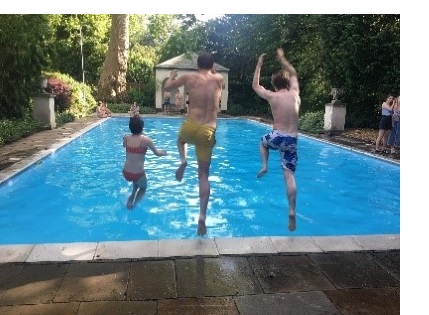
adaptable for anything important that might crop up in the middle of it. Just knowing that this has been organised prior to term makes me more excited about how productive and fun this second year is going to be, even when it inevitably all changes and falls apart!
Thirdly, the College part of my life is getting super exciting next year. I was lucky enough to land a College-owned house to live in with seven of the best friends I could have possibly made in Cambridge. They are all amazingly supportive of me and make me laugh to no end, which means – despite the fact that I might kill some of them over the washing up – next year is going to be a barrel of fun.
I can only hope that you choose to apply here and have as wonderful a time as I have. I wouldn’t change anything about my time so far; it’s made me into the confident and happy person that I have always aimed to be.
August 2019
Please be aware if you're considering an application that our student writers describe their experiences. Although the majority of the information stays the same, some details may change from year to year. Do read the student profiles in combination with our undergraduate admissions pages for full information.
Back to Student profiles page / Linguistics at Christ's / Next: Imogen's profile
